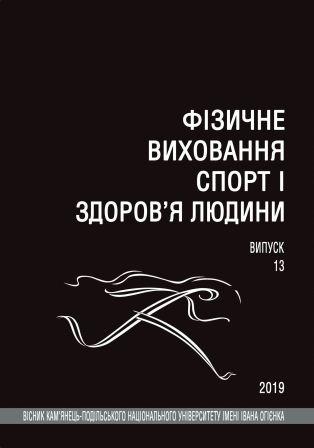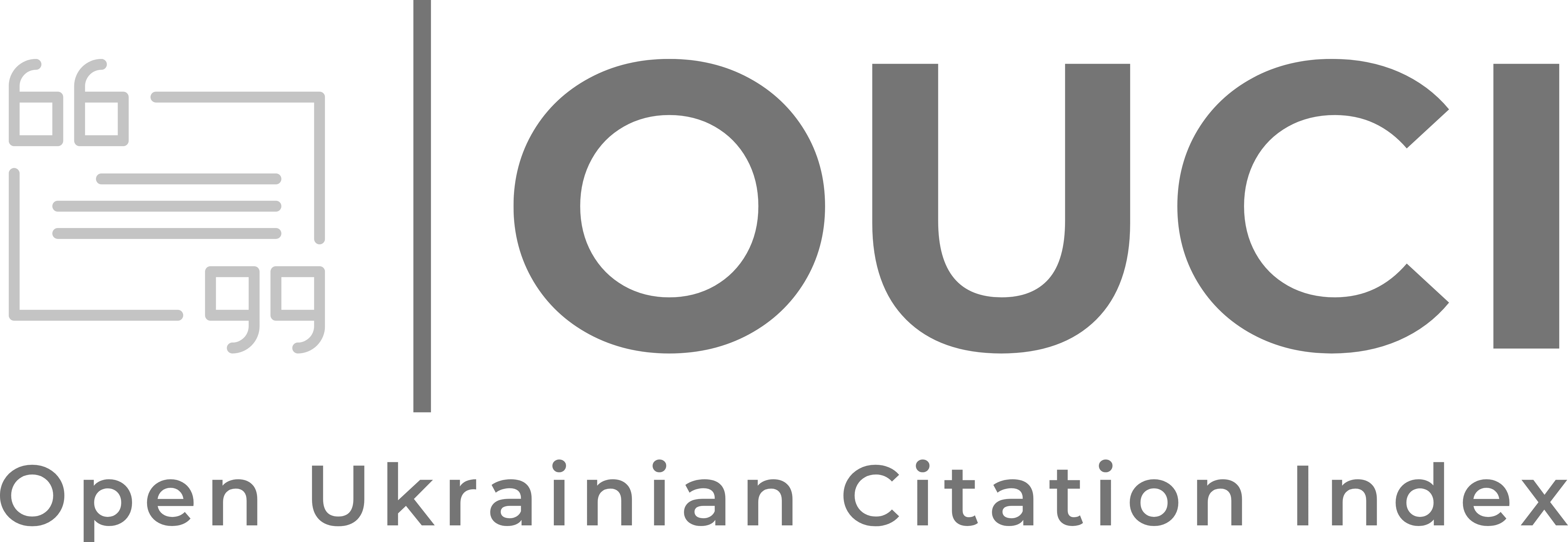FEATURES OF FREE TIME PEDAGOGY IN THE CONDITIONS OF HEALTH PRESERVING STUDY OF STUDENTS
DOI:
https://doi.org/10.32626/2309-8082.2019-13.15-22Ключові слова:
culture, free time, health preserving study, students.Анотація
The aim of this work was to develop
and experimentally check the integrative pedagogical technology of
organization of physical culture and health activities, which helps to
optimize the process of forming a culture of free time of students.
Material and methods: 168 people (students and graduates of higher
educational institutions) participatedin the research. The pedagogical
experiment was conducted during 2016–2017 years. Methods were
used: theoretical, empirical and methods of mathematical statistics.
Results. It is proved that the pedagogy of forming the culture of free
time of students should consider the hierarchy of interconnections
between the three spheres of life: cognitive, emotional and motor. After
the completion of the pedagogical experiment 86,8% of students of the
experimental group and 34,4% of the control group appreciated that
knowledge obtained during the studying would help them properly
organize recreational activities during leisure. Conclusions. Modeling
the process of health preserving students’ study on the principles of
free time pedagogy helped to form their readiness for using active forms
of leisure. A positive dynamics in data of self-esteem of educational level
in the issues of leisure organization by the students of the experimental
group is observed. The high level of such education after the completion
of the experiment was indicated by 73,1% of the interviewed students
of the experimental group, compared with 29,3% – before the
experiment.The statistical-probabilistic analysis (Student’s Criterion,
Chuprov’s coefficient, factor analysis, etc.) of the data confirmed it
representativeness and reliability, and pointed to the positive impact of
the culture of free-time formation program of students.
Посилання
Lytovchenko G. Doslidzhennya faktoriv, yaki mozhut vplyvaty na
tryvalist zhyttya lyudyny [Investigation of factors which can affect the
life expectancy of a person]. Pedagogika, psyhologiya ta medyko-biolo
gichniproblemyfizychnogovyhovannyaisportu2007;1: 73–76.
https://stats.bls.gov/news.release/pdf/atus.pdf. (accessed 2019 Feb 02)
Bielski J. Aktywność fizyczna ucznia w czasiewolnym [Physical activity
of the student during free time]. Fizychnevyhovannya, sport i kultura
zdorovya u suchasnomususpilstvi2008; 2: 15–19.
Prystupa Ye., Zhepka A., Lara W. Rekreaciya, yak socialno-kulturne
yavyshche, riznovydi rezultat diyalnosti [Recreation as a socio-cultural
phenomenon, kind and result of activity]. Pedagogika, psyhologiya ta
medyko-biologichni problem fizychnogo vyhovannya i sportu 2007; 1:
–120.
Ryzhkin Yu. Fizicheskaya rekreacyya v sfere dosuga cheloveka
[Physical recreation in the sphere of human leisure].
Teoriyaipraktikafizicheskojkultury2002;5: 17-19.
Savchuk S., Kovalchuk V. Organizaciya vilnogo chasu u studentiv
[Organization of students’ free time]. Molodyivchenyi2015; 3(2):
–117.
Maksymovska N. Socialno-pedagogichna eksplikaciya ponyattya «sfera
dozvillya» [Socio-pedagogical explication of the notion “sphere of
leisure”]. Visnyk Kharkivskoyi derzhavnoyi akademiyi kultury 2012;38:
–276.
Prystupa Ye., Zhdanova O., Lynets M. Fizychna rekreaciya [Physical
recreation]. Drogobych: KOLO; 2010.
Pereguda Y., editor. Sociologiya [Sociology]. Kyiv: KNUBA; 2012.
Prystupa Ye., Zhepka A., Lech W. Koncepciyi vilnogo chasu lyudyny,
yak vazhlyvoyi kategoriyi rekreaciyi [Concepts of free human time
as an important category of recreation]. Pedagogika, psyhologiya ta
medyko-biologichni problem fizychnogo vyhovannya i sportu2007; 1:
–112.
Martyka A. Czas wolny dzieci we współczesnych polskich miastach.
Wprowadzenie do poszukiwań optymalnych rozwiązań przestrzennych
[Children’s free time in the contemporary Polish cities. Introduction into
prospecting of the optimal spatial solutions]. CzasopismoTechniczne.
Architektura2012; 29: 105–120.
Pilawska A., Pilawski A., Petrynski W. Zarys teorii i metodyki rekreacji
ruchowej [Outline of the theory and methodology of physical
recreation]. Katowice: GWSH; 2003.
Kiełbasiewicz-Drozdowska I., Siwiński W. Teoria i metodyka rekreacji
(zagadnienia podstawowe) [Theory and methodology of recreation
(basic issues)]. Poznan: AWF; 2001.
Zavydivska N., Rymar O., Malanchuk H. Innovative mechanisms of
improvement of student’s physical education system on the basis of
interdisciplinary connections. Journal of Physical Education and Sport
; 15(4): 758-764. doi:10.7752/jpes.2015.04116
Puciato D., Szczebak T. Wybrane aspekty zagospodarowania czasu
wolnego u młodzieży z różny chśrodowisk [Selected aspects of
managing free time of young people from various environments].
Zeszyty naukowe Małopolskiej Wyższej szkoły ekonomicznej w
Tarnowie2011; 18(1): 83–94.
Toczek-Werner S. Podstawy rekreacji i turystyki [Basics of recreation
and tourism]. Wroclaw: AWF; 2008.
Zavydivska O., Zavydivska N., Khanikiants O., Rymar O. The paradigm
of health maintenance at Higher Education Institutions as an
Important Component of Human Development in Terms of Modernity.
Journal of Physical Education and Sport 2017; 17(1): 60–65.doi.7752/
jpes.2017.s 1009.
Oliynyk I. Formuvannya kultury dozvillya studentskoyi molodi
[Formation of leisure culture of student youth]. Fizychnevyhovannya,
sport ikulturazdorovya u suchasnomususpilstvi2013;1(21):207–212.
Wyrzykowski J. Studia nad czasem wolnym mieszkańców dużych miast
Polskiijego wykorzystaniem na rekreację ruchową i turystykę [Studies
on the free time of residents of large Polish cities and its use for
physical recreation and tourism]. Wroclaw: AWF; 2000.
Dumazedier J. Toward a society of leisure. International Journal of
Cultural Policy 2010; 16(1): 45–47.




